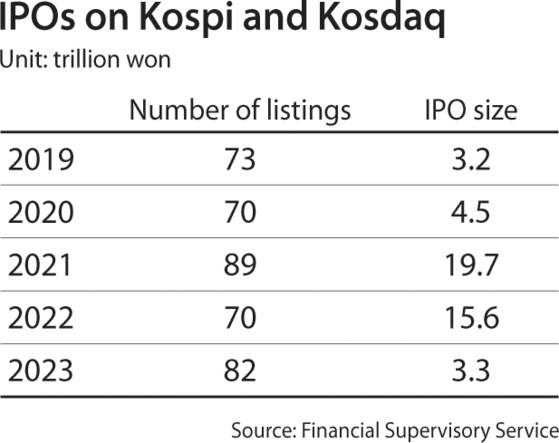IPO market heating up this year with soaring day-one prices
![Initial Public Offering image [GETTY IMAGES]](https://img1.daumcdn.net/thumb/R658x0.q70/?fname=https://t1.daumcdn.net/news/202403/19/koreajoongangdaily/20240319070027479wlwv.jpg)
Korea’s initial public offering (IPO) market is heating up again this year as IPOs are priced above range and stock prices soar to triple digits upon debuting.
The market was largely led by small and mid-sized firms in January, and the beauty tech products seller APR in February. More are waiting to go public later this year, including internet-only Kbank and HD Hyundai Marine Solution.
“By the number of companies listed, 2023 showed a meaningful recovery after hitting the bottom, and the growth is projected to continue in 2024,” said Choi Jong-kyung, an analyst at Heungkuk Securities.
He cited an increase in the number of Kospi listings and the cycle that comes every five to six years.
“A cycle is determined by the rate of return. If the return is high, swathes of funds swarm to the market, which then reduces the rate of return and ultimately pulls away funds.” Choi added that an IPO boom was witnessed in 2009, 2014 and 2020, and the next wave could arrive as early as this year.
A good IPO market is determined by the number of listings, the size of funds raised and the price-earnings ratio.
A total of 82 companies went public on the Kospi and Kosdaq markets last year, up from 70 firms a year earlier, according to the Financial Supervisory Service (FSS), but the amount of funds raised decelerated to 3.3 trillion won ($2.5 billion) from 15.6 trillion won over the same period.
Around 85 listings are expected this year, which are projected to raise 6.4 trillion won, according to the Korea Exchange and Heungkuk Securities.
APR, which was priced above the indicated range, soared 87 percent from the IPO price on the day of its Kospi debut on Feb. 27. Prices of Woojin Engineering & Technology, a power generation facility maintenance company, and Hyundai Hyms, a producer of shipbuilding equipment, climbed to the maximum limit of 300 percent of their IPO price on the day of listing in January.
All six companies that went public on the Kospi and Kosdaq in February were priced above the range, including Inics, Studio Samick and Coxem.

As the market heats up, unicorn businesses that delayed IPOs are reattempting a debut.
The internet-only Kbank said it will go public this year, almost two years after scrapping its previous IPO plan due to weak investor sentiment.
We’ve decided to retry the IPO considering the improved market situation,” said Lee Jae-hoon, a PR manager at Kbank.
A fall in corporate value has not stymied the company's determination, with its stock price on the Seoul Exchange, a trading platform for non-listed stocks, falling to around half of its 2021 peak to trade at 17,550 won as of Monday.
Other listings, still or at one time unicorns, expected to go public this year or possibly next year include ecommerce operator Kurly and accommodation-booking platform Yanolja, both of which have not officially confirmed dates for their IPO plans. Viva Republica, the operator of Toss internet bank, is also anticipated to go public next year.
Kurly had ambitiously sought to be listed in the United States, trying to follow the footsteps of Coupang, which debuted on the New York Stock Exchange in March 2021. Yanolja was also reported to be pushing for Nasdaq listing in 2021.
Their prices on the Seoul Exchange have also collapsed to half of their peaks.
Kurly’s stock price flopped to 16,500 won apiece from above 110,000 won in 2022, while that of Yanolja plunged to around half of its 2021 peak to trade at 60,000 won.
There are concerns that IPOs are gathering too much steam.
“An increasing number of IPOs are priced expensively, raising the need to lower the expected rate of return,” said Kim Soo-yeon, a market analyst at Hanwha Investment & Securities in a report on March 6.
The average offering price in the past was 5.9 percent higher than the upper limit of the price band. But so far this year, it is 17 percent higher.
The FSS said it will bring out a guideline to improve the soundness of the IPO market in the second quarter to prevent the sudden collapse of stock prices after listing.
The financial watchdog is reviewing the IPO system, including the calculation method and demand forecasts.
Last year, some IPOs faced scrutiny after investors questioned the eligibility of their listings for not disclosing information that could be pivotal to their stock price. FADU, a fabless solid-state drive and controller company, has seen its stock price lose more than half its peak value, and the company and its underwriters became mired in class action lawsuits.
“The maturity of the IPO market is directly related to the competitiveness of the capital market, so there is a need to improve its system and customs,” said Kim Min-ki, a capital markets research fellow at the Korea Capital Market Institute in a report last month. “The key is resolving the information asymmetry and strengthening the independence and responsibility of underwriters, who connect corporations with retail investors.”
BY JIN MIN-JI [jin.minji@joongang.co.kr]
Copyright © 코리아중앙데일리. 무단전재 및 재배포 금지.
- Super Junior-D&E cancels performances after 'derogatory' song sparks backlash
- Young Samsung workers flock to labor union in protest of 'disappointing' salary
- Dodgers beat Korea 5-2 in final exhibition game before season opener
- Dodgers and Padres in Seoul: Here's what you need to know
- Hyeri apologizes for 'emotional response' to Ryu Jun-yeol, Han So-hee dating news
- Swiss man flies to Korea, gives $150K to romance scammer posing as woman
- Le Sserafim's Huh Yun-jin under fire for drinking 'pro-Israel' Starbucks
- Boy band Omega X's former agency accuses member of harassment
- Missing Japanese tourist with mild dementia found in Seoul after online post
- Riize's Seunghan to 'indefinitely' halt activities due to controversial past